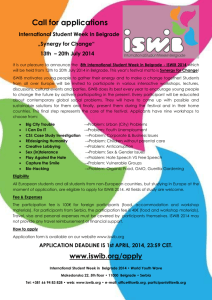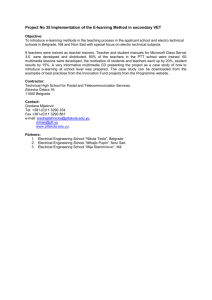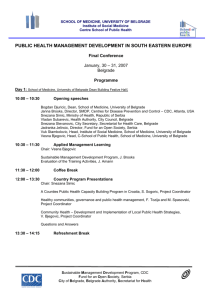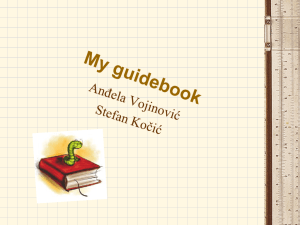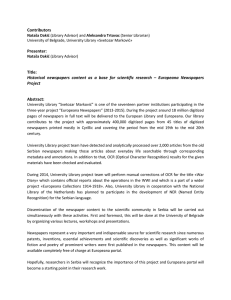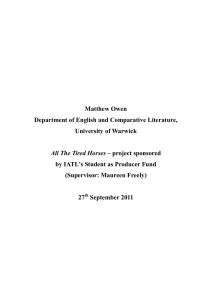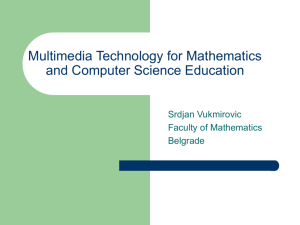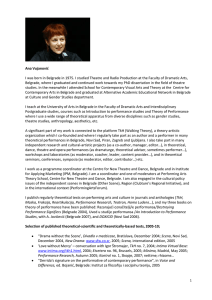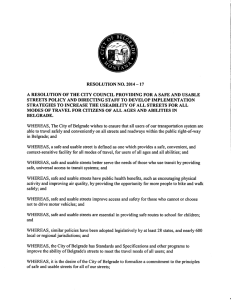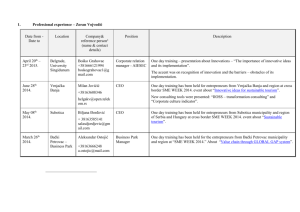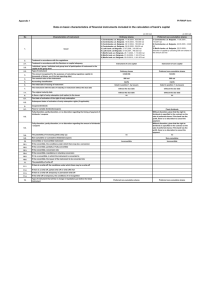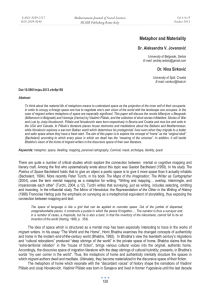1 University of Arts in Belgrade Faculty of Music Department of
advertisement
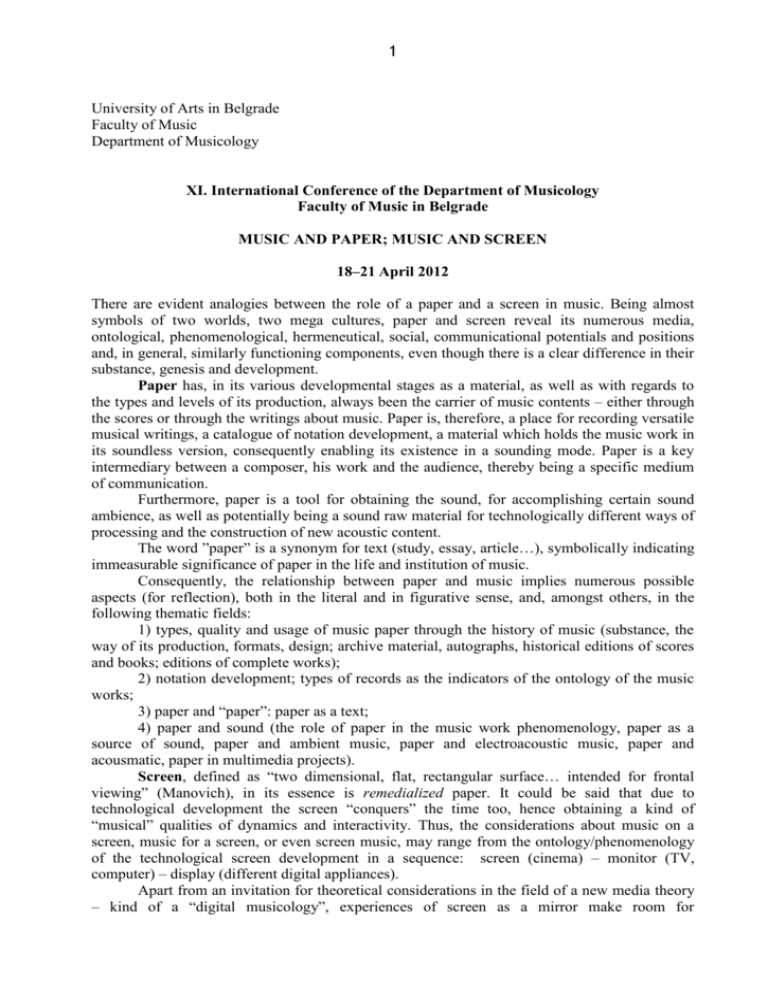
1 University of Arts in Belgrade Faculty of Music Department of Musicology XI. International Conference of the Department of Musicology Faculty of Music in Belgrade MUSIC AND PAPER; MUSIC AND SCREEN 18–21 April 2012 There are evident analogies between the role of a paper and a screen in music. Being almost symbols of two worlds, two mega cultures, paper and screen reveal its numerous media, ontological, phenomenological, hermeneutical, social, communicational potentials and positions and, in general, similarly functioning components, even though there is a clear difference in their substance, genesis and development. Paper has, in its various developmental stages as a material, as well as with regards to the types and levels of its production, always been the carrier of music contents – either through the scores or through the writings about music. Paper is, therefore, a place for recording versatile musical writings, a catalogue of notation development, a material which holds the music work in its soundless version, consequently enabling its existence in a sounding mode. Paper is a key intermediary between a composer, his work and the audience, thereby being a specific medium of communication. Furthermore, paper is a tool for obtaining the sound, for accomplishing certain sound ambience, as well as potentially being a sound raw material for technologically different ways of processing and the construction of new acoustic content. The word ”paper” is a synonym for text (study, essay, article…), symbolically indicating immeasurable significance of paper in the life and institution of music. Consequently, the relationship between paper and music implies numerous possible aspects (for reflection), both in the literal and in figurative sense, and, amongst others, in the following thematic fields: 1) types, quality and usage of music paper through the history of music (substance, the way of its production, formats, design; archive material, autographs, historical editions of scores and books; editions of complete works); 2) notation development; types of records as the indicators of the ontology of the music works; 3) paper and “paper”: paper as a text; 4) paper and sound (the role of paper in the music work phenomenology, paper as a source of sound, paper and ambient music, paper and electroacoustic music, paper and acousmatic, paper in multimedia projects). Screen, defined as “two dimensional, flat, rectangular surface… intended for frontal viewing” (Manovich), in its essence is remedialized paper. It could be said that due to technological development the screen “conquers” the time too, hence obtaining a kind of “musical” qualities of dynamics and interactivity. Thus, the considerations about music on a screen, music for a screen, or even screen music, may range from the ontology/phenomenology of the technological screen development in a sequence: screen (cinema) – monitor (TV, computer) – display (different digital appliances). Apart from an invitation for theoretical considerations in the field of a new media theory – kind of a “digital musicology”, experiences of screen as a mirror make room for 2 psychoanalytic and post-structuralist platforms, ranging from, for example, text/subject/body to hypertext/cyborg/posthuman body; contemporary expansion of digital media provokes rethinking of phenomenological questions which also concern music (Deleuze and Guattari, Hansen), as well as crucial sociological questions (network, the economy of networks – Castells), and questions from the domain of digital culture studies. Amongst the musicological issues open by the remedialization of a paper into a screen, the following five interesting thematic fields are being open for consideration, whilst mirroring the previous four (about the paper): 5) paper-screen – framing the time; 6) paper-text; screen – hypertext; 7) from a paper to a screen – from archives to digital archives (digitalization of music data, databases, digital libraries, internet publications); 8) screen and sound (phenomenology of music works, software solutions, new formats – music production and musicological production) – screen music (computer generated music); 9) music on a screen, music for a screen a) music on/for screen (film/movie music, music for a film); b) music on/for monitor (music on television, music for television, music video spot, music for paper and music for monitor – electro acoustic music); c) music on/for display (I-pod, I-phone and mobile phones). Please submit your paper topic (including the number of the thematic area as described above) not later than 31 October 2011 to Marijana Kocić: mpms@fmu.bg.ac.rs Please include your short biography and an abstract of 250 words. You will be notified by 20 December 2011 if your topic has been accepted. The official language of the conference is English. It is possible to deliver papers also in German, French, Russian, and Serbian, but the authors are kindly requested to provide translation in English. The time limit for the presentation and discussion of your paper is set at 30 minutes in total. Selected papers presented at the conference will be published in the proceedings. Participation fee: 50€ if paid before 31 January 2012, and 70 € after that date. Both participation at the Conference and the publication of a text whose topic has been accepted by the Program Committee are conditional upon the payment of the participation fee. Program Committee: Dr. Antonio Baldassarre, Hochschule Luzern - Music Dr. Jeremy Cox, AEC Dr. Vesna Mikić, Faculty of Music, University of Arts in Belgrade Dr. Ivana Perković, Faculty of Music, University of Arts in Belgrade Dr. Tijana Popović-Mlađenović, Faculty of Music, University of Arts in Belgrade Dr. Ruta Stanevičiute, Lithuanian Academy of Music and Theatre Dr. Leon Stefanija, Faculty of Arts, University of Ljubljana 3 Dr. Mirjana Veselinović-Hofman, Faculty of Music, University of Arts in Belgrade Dr. Chris Walton, University of Stellenbosch Organizing Committee: Dr. Vesna Mikić Dr. Ivana Perković Dr. Tijana Popović-Mlađenović Dr. Mirjana Veselinović-Hofman Marijana Kocić
